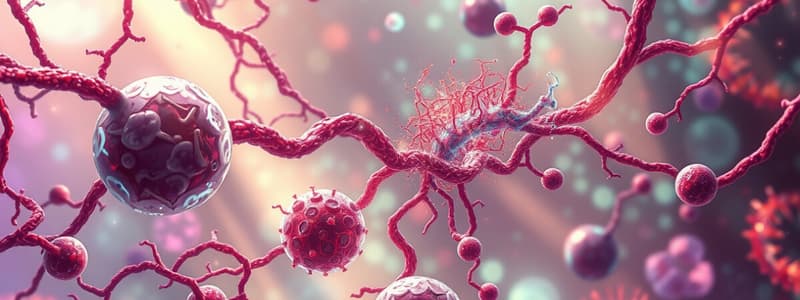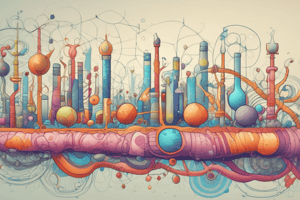Podcast
Questions and Answers
What is one of the specific tasks that cells require energy for?
What is one of the specific tasks that cells require energy for?
- To stimulate a metabolic reaction (correct)
- To generate waste
- To break down ATP
- To produce glucose
What is cell metabolism defined as?
What is cell metabolism defined as?
- The breakdown of ATP
- The sum of all physical chemical changes that occur in the body (correct)
- The creation of energy from glucose
- The transport of substances across membranes
Which of the following describes the process of catabolism?
Which of the following describes the process of catabolism?
- Breaking down larger molecules into smaller ones (correct)
- Building proteins from amino acids
- Utilizing glucose for energy
- Creating glucose from smaller substances
What is the primary outcome of cellular respiration?
What is the primary outcome of cellular respiration?
How many ATPs are required for optimal cellular function according to the content?
How many ATPs are required for optimal cellular function according to the content?
What is the primary byproduct of glycolysis?
What is the primary byproduct of glycolysis?
Which stage of cellular metabolism is known for producing the most ATP?
Which stage of cellular metabolism is known for producing the most ATP?
Which of the following statements about the Krebs Cycle is true?
Which of the following statements about the Krebs Cycle is true?
What percentage of carbon dioxide is transported in the blood as bicarbonate?
What percentage of carbon dioxide is transported in the blood as bicarbonate?
Which method does the body primarily utilize to regulate bicarbonate?
Which method does the body primarily utilize to regulate bicarbonate?
Which of the following correctly describes the efficiency of glycolysis?
Which of the following correctly describes the efficiency of glycolysis?
What is a byproduct of cellular metabolism that diffuses easily across cellular membranes?
What is a byproduct of cellular metabolism that diffuses easily across cellular membranes?
Which of the following statements best describes the anaerobic respiration that occurs in the Krebs Cycle?
Which of the following statements best describes the anaerobic respiration that occurs in the Krebs Cycle?
What is the byproduct of the kidney's conversion of bicarbonate?
What is the byproduct of the kidney's conversion of bicarbonate?
Which process occurs in the absence of oxygen?
Which process occurs in the absence of oxygen?
What condition arises from the conversion of pyruvic acid in anaerobic respiration?
What condition arises from the conversion of pyruvic acid in anaerobic respiration?
How many ATP molecules are produced during the final stage of Cellular Respiration?
How many ATP molecules are produced during the final stage of Cellular Respiration?
Which of the following is necessary for the Krebs Cycle to function?
Which of the following is necessary for the Krebs Cycle to function?
What is the primary treatment for a patient in cardiac arrest?
What is the primary treatment for a patient in cardiac arrest?
What is the primary outcome of aerobic respiration?
What is the primary outcome of aerobic respiration?
Which metabolic product elevates following sodium bicarbonate treatment?
Which metabolic product elevates following sodium bicarbonate treatment?
What is the primary purpose of ATP in cellular processes?
What is the primary purpose of ATP in cellular processes?
Which of the following statements about catabolism is true?
Which of the following statements about catabolism is true?
What are the net energy outputs of glycolysis?
What are the net energy outputs of glycolysis?
In which stage of cellular respiration is glucose oxidized?
In which stage of cellular respiration is glucose oxidized?
Which of the following best describes the relationship between catabolism and anabolism?
Which of the following best describes the relationship between catabolism and anabolism?
What process occurs during anaerobic respiration when oxygen is not available?
What process occurs during anaerobic respiration when oxygen is not available?
What is the primary consequence of elevated carbon dioxide levels in relation to metabolic processes?
What is the primary consequence of elevated carbon dioxide levels in relation to metabolic processes?
How many ATP molecules are produced during the electron transport chain stage of cellular respiration?
How many ATP molecules are produced during the electron transport chain stage of cellular respiration?
Which statement accurately reflects the process of aerobic respiration?
Which statement accurately reflects the process of aerobic respiration?
What is the final goal of cellular respiration in terms of ATP production?
What is the final goal of cellular respiration in terms of ATP production?
Which factor directly affects the production of ATP during aerobic respiration?
Which factor directly affects the production of ATP during aerobic respiration?
What treatment option is typically employed for patients experiencing sepsis?
What treatment option is typically employed for patients experiencing sepsis?
What is a significant result of cellular respiration under aerobic conditions?
What is a significant result of cellular respiration under aerobic conditions?
What is the primary reason glycolysis is considered the least efficient stage of cellular metabolism?
What is the primary reason glycolysis is considered the least efficient stage of cellular metabolism?
Which statement correctly describes the Krebs Cycle?
Which statement correctly describes the Krebs Cycle?
How is carbon dioxide primarily transported in the body?
How is carbon dioxide primarily transported in the body?
Why is the Electron Transport Chain regarded as the most efficient stage of cellular metabolism?
Why is the Electron Transport Chain regarded as the most efficient stage of cellular metabolism?
What role does the kidney play in relation to carbon dioxide and bicarbonate?
What role does the kidney play in relation to carbon dioxide and bicarbonate?
What are the byproducts of the Krebs Cycle?
What are the byproducts of the Krebs Cycle?
What characterizes the efficiency of the Electron Transport Chain compared to earlier stages of metabolism?
What characterizes the efficiency of the Electron Transport Chain compared to earlier stages of metabolism?
Which of the following statements about the production of pyruvic acid is true?
Which of the following statements about the production of pyruvic acid is true?
Study Notes
Cellular Tasks
- Cells require energy for stimulating metabolic reactions, transporting substances across membranes, and performing mechanical work such as muscle movement.
Metabolism
- Cell metabolism encompasses all physical and chemical changes in the body; it is energy-dependent.
Anabolism
- Anabolic processes build larger substances from smaller units, exemplified by protein synthesis from amino acids.
Catabolism
- Catabolic processes involve breaking down larger molecules into smaller ones, such as carbohydrates, fats, and proteins.
Cell Respiration
- Essential for metabolic functions; glucose oxidation produces CO2, H2O, ATP, and acids.
- ATP (Adenosine Triphosphate) serves as the primary energy source, vital for cellular tasks.
Stages of Cellular Respiration
- Energy production includes three stages: Glycolysis, Krebs Cycle, and Electron Transport Chain.
- Approximately 36 ATP molecules are needed for optimal cellular function.
Glycolysis
- The first stage stabilizes glucose using ATP and prepares it for further breakdown but results in pyruvic acid, lactic acid, limited ATP, and CO2.
Krebs Cycle
- The second stage, or citric acid cycle, breaks down pyruvic acid in both aerobic (with oxygen) and anaerobic (without oxygen) environments, generating pyruvic acid, CO2, H2O, and ATP.
Carbon Dioxide Transport
- CO2 is transported from cells: 65% as bicarbonate, 25% bound to blood proteins, and 10% in plasma.
- CO2 diffuses easily across cellular membranes and is a byproduct of bicarbonate production.
Kidney Function and CO2
- Kidneys filter waste from metabolism and regulate bicarbonate, producing CO2, which acts as a weak acid. Treatments like sodium bicarbonate release CO2, potentially elevating blood CO2 levels.
Anaerobic Respiration
- In the absence of oxygen, glycolysis continues, leading to the accumulation of lactic acid and risking metabolic acidosis.
Aerobic Respiration
- With sufficient oxygen, the Krebs Cycle efficiently breaks down pyruvic acid, producing CO2 and ATP, allowing progress to the final respiration stage.
Electron Transport Chain
- The third stage is responsible for generating the highest ATP yield (34 ATP) and operates exclusively under aerobic conditions.
Final Goals of Cellular Respiration
- The ultimate aim of cellular respiration is to achieve 36 total ATP for energy.
Clinical Implications
- In emergencies like cardiac arrest, chest compressions are critical ("Prime The Heart"), while shock and sepsis management involves fluids and oxygen for sick patients.
Cellular Tasks
- Cells require energy for stimulating metabolic reactions, transporting substances across membranes, and performing mechanical work such as muscle movement.
Metabolism
- Cell metabolism encompasses all physical and chemical changes in the body; it is energy-dependent.
Anabolism
- Anabolic processes build larger substances from smaller units, exemplified by protein synthesis from amino acids.
Catabolism
- Catabolic processes involve breaking down larger molecules into smaller ones, such as carbohydrates, fats, and proteins.
Cell Respiration
- Essential for metabolic functions; glucose oxidation produces CO2, H2O, ATP, and acids.
- ATP (Adenosine Triphosphate) serves as the primary energy source, vital for cellular tasks.
Stages of Cellular Respiration
- Energy production includes three stages: Glycolysis, Krebs Cycle, and Electron Transport Chain.
- Approximately 36 ATP molecules are needed for optimal cellular function.
Glycolysis
- The first stage stabilizes glucose using ATP and prepares it for further breakdown but results in pyruvic acid, lactic acid, limited ATP, and CO2.
Krebs Cycle
- The second stage, or citric acid cycle, breaks down pyruvic acid in both aerobic (with oxygen) and anaerobic (without oxygen) environments, generating pyruvic acid, CO2, H2O, and ATP.
Carbon Dioxide Transport
- CO2 is transported from cells: 65% as bicarbonate, 25% bound to blood proteins, and 10% in plasma.
- CO2 diffuses easily across cellular membranes and is a byproduct of bicarbonate production.
Kidney Function and CO2
- Kidneys filter waste from metabolism and regulate bicarbonate, producing CO2, which acts as a weak acid. Treatments like sodium bicarbonate release CO2, potentially elevating blood CO2 levels.
Anaerobic Respiration
- In the absence of oxygen, glycolysis continues, leading to the accumulation of lactic acid and risking metabolic acidosis.
Aerobic Respiration
- With sufficient oxygen, the Krebs Cycle efficiently breaks down pyruvic acid, producing CO2 and ATP, allowing progress to the final respiration stage.
Electron Transport Chain
- The third stage is responsible for generating the highest ATP yield (34 ATP) and operates exclusively under aerobic conditions.
Final Goals of Cellular Respiration
- The ultimate aim of cellular respiration is to achieve 36 total ATP for energy.
Clinical Implications
- In emergencies like cardiac arrest, chest compressions are critical ("Prime The Heart"), while shock and sepsis management involves fluids and oxygen for sick patients.
Studying That Suits You
Use AI to generate personalized quizzes and flashcards to suit your learning preferences.
Description
Explore the fundamental concepts of cellular tasks including metabolism, anabolism, and catabolism. Understand the stages of cellular respiration and the crucial role of ATP in energy production. This quiz is designed for students studying cell biology and related subjects.




